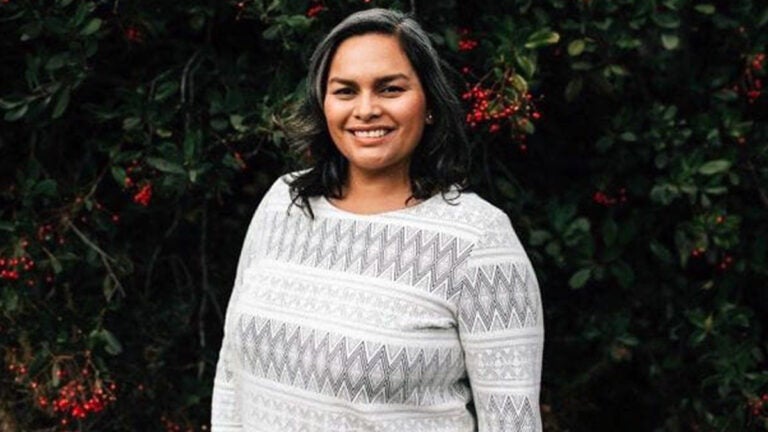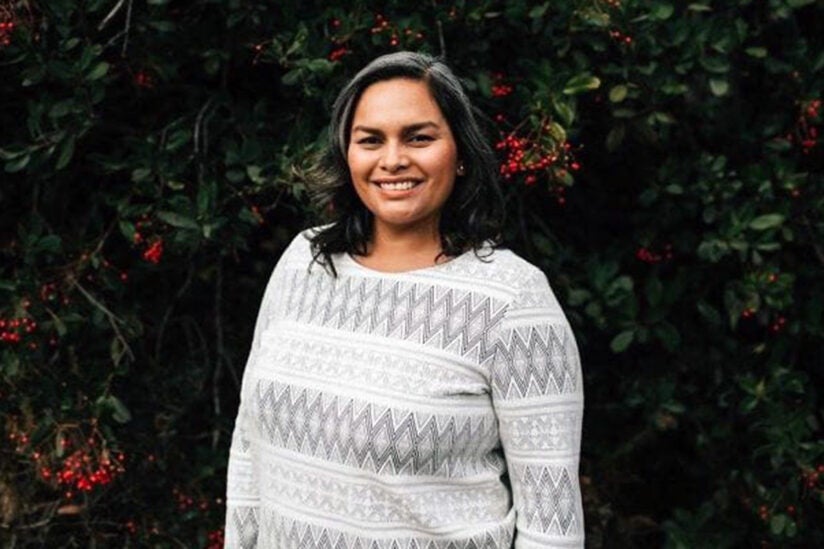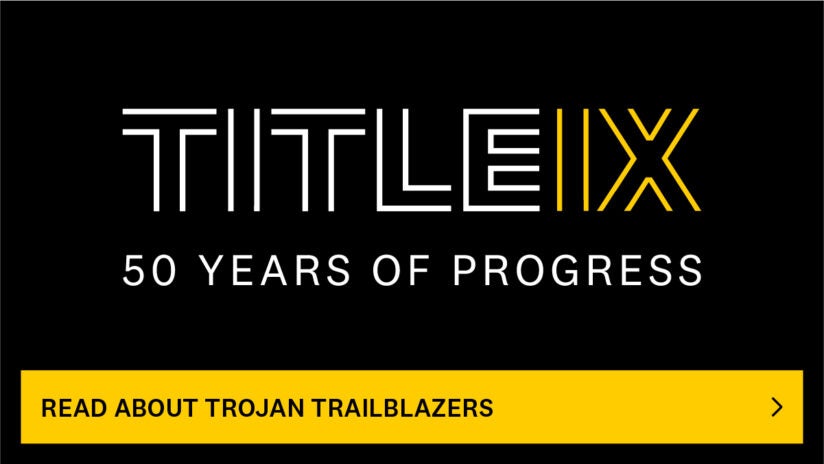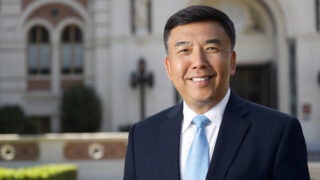
Nadia Palacios is the assistant vice provost for student equity and inclusion in USC Student Affairs. (Photo/Rachael West)
Trojan trailblazer uses her institutional knowledge to better support underserved communities on campus
TITLE IX: For Naddia Palacios, the assistant vice provost for student equity and inclusion in USC Student Affairs, being intentional about intersectionality is key.
Editor’s note: Title IX — the landmark legislation that prohibits sex discrimination in educational institutions that receive federal funding — was signed into law on June 23, 1972. In recognition of this anniversary, we’ll be profiling Trojan Title IX trailblazers throughout the year.
Naddia Palacios has spent the majority of her career focused on gender equity work and directly advocating for hundreds of student survivors.
“Title IX is such a big deal for me,” said Palacios, the assistant vice provost for student equity and inclusion in USC Student Affairs. “It gave me professional focus … as I developed services for survivors and prevention education programs for whole campuses.”
Her journey toward becoming an equity trailblazer was a gradual one, Palacios said. As an undergraduate student, Palacios shared that her experience at her campus’s women’s center focused solely on her gender and was not about intersectionality.

“As a person of color, I did not find that it was a space that took into consideration my intersections of identity,” she said.
It was not until she enrolled in the Postsecondary Administration and Student Affairs master’s program at the USC Rossier School of Education that her focus on gender and gender equity solidified. Palacios credits her mentors and directors at USC Rossier with giving her the terminology that would later help her educate campus communities on prevention and advocacy through an equity lens.
During her graduate studies, Palacios worked for the USC Center for Women and Men, mainly focusing on issues around race, intersectionality and center operations. In her role, she developed prevention education and gender equity programs, including a panel of women of color who discussed their experiences at USC and a women’s leadership retreat in partnership with student government. The office Palacios worked in as a graduate assistant eventually became USC Student Health’s Relationship and Sexual Violence Prevention and Services, which now specifically focuses on support, prevention and advocacy services relating to gender and power-based harm.
Becoming an advocate
After graduating from her master’s program, Palacios developed sexual violence prevention and intervention programs at multiple colleges and universities. Certified by California as a counselor advocate through the nonprofit Peace Over Violence, she served as a direct advocate for hundreds of students.
At Occidental College, Palacios was the first full-time advocate hired to improve culture on campus. She restructured and institutionalized Project SAFE (Sexual Assault Free Environment), originally a student organization, developing its campuswide prevention education program and creating a multidisciplinary team consisting of nurses, counselors and advocates for survivors. Additionally, she founded the Center for Gender Equity at Occidental, which provides support, advocacy and programming that promotes awareness, personal empowerment, mutual respect and equity.
She then moved to the University of California, Riverside, where she was the only advocate for students affected by interpersonal violence on campus. She grew the office into a fully staffed CARE (Campus Advocacy, Resources, & Education) Center, adding services for faculty and staff, streamlining all advocacy services and prevention education with intersectionality in mind, and partnering with offices across the campus to improve response and prevention programs campuswide.
“If you ask people that went to college in the early aughts or ’90s, I don’t think most people knew that the university was there to support students,” Palacios said.
For eight years of her career, much of her work focused on ensuring compliance with Title IX. She added, “I’m thankful that students are aware of the resources now, that the resources are more structured and prevention education has become more institutionalized.” This is one of the many reasons she values spaces like RSVP and Student Affairs that work on campus culture and provide necessary resources to students.
Working inside and outside the university
Palacios’ work has not only been at the institutional level. She has worked statewide and nationally, collectively lobbying within the UC system to protect student confidentiality and create protections for employees who provided advocacy within the system.
She volunteered with the National Association of Student Personnel Administrators and assisted in the establishment of the Sexual and Relationship Violence Prevention, Education, and Response Knowledge Community. In 2018, the association recognized Palacios’ work developing advocacy programs with the Doris Michiko Ching Award for Excellence as a Student Affairs Professional, which honors mid- and senior-level student affairs professionals who have shown outstanding commitment to the profession through innovative programming and the creation of a campus environment that promotes student development.
Palacios returned to USC in 2018. Her work on campus focuses on intersectionality. Partnering with the Office for Equity, Equal Opportunity, and Title IX, her team helps support students to learn more information about their rights under Title IX and connect them with support when needed. USC’s combination of Title IX and equal opportunity work provides students who experience racial discrimination or other forms of protected class discrimination with a specific office to go to on campus, which has been a great support for the student communities with whom Palacios’ team works.
The next steps
In that vein, Palacios recently hired a gender equity resources coordinator. This new position will strengthen Student Equity and Inclusion Programs, partner with the equity and Title IX office, lead programming efforts to provide students with access to dialogue around gender-related issues and streamline gender equity resources across the student cultural centers.
Looking to the future, Palacios wants to continue to keep intersectionality front of mind as she and her team develop a cohesive vision for gender equity and inclusion on campus.
“We’re having conversations across multiple identities in Student Equity and Inclusion Programs,” Palacios said. “I want to be intentional about intersectionality and expand our offerings for students to explore gender, gender identity and gender equity during their time at USC.”




